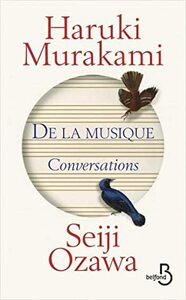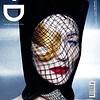Take a photo of a barcode or cover
Klasickú hudbu som si prvý krát vedome zapla, keď som mala asi 8 rokov a doma sme mali celé diskografie Mozarta, Beethovena, Čajkovského atď. (predpokladám Reader's Digest kolekcie). Mama prišla domov a našla ma v obývačke na zemi, s obrovskými sluchátkami na ušiach, počúvať orchestrálne symfónie. Neviem či aj kvôli tomu ma nedala na kurz zobcovej flauty.
Hlbšie som znovu klasiku počúvala až na vysokej škole na všelijakých dejinách hudby. Nikdy som ale neskúmala bližšie prácu dirigentov.
Vždy mi to prišlo ako komplikované mávanie paličkou, ale až v tejto knihe som zistila, že dirigentúra nie je len o mávaní paličkou, ale predchádzajú tomu hodiny a hodiny čítania a drvenia sa notových zápisov pre všetky nástroje v orchestri (!). Dirigent je vlastne taký hudobný režisér, ktorý dá orchestru a hudbe dušu. Rovnaká skladba môže preto znieť u rôznych dirigentov inak (pomalšie/rýchlejšie, živšie/tichšie,..).
Seiji Ozawa patrí medzi dirigentskú špičku a Murakami má veľmi rád svoj jazz a klasiku (čo vidno aj v jeho románoch). Najobdivuhodnejšie bolo, že Murakami si pamätá, kto ako hral na koncerte pomaly pred 30-40rokmi. Obaja dávali také detaily spred miliónov rokov, že som nechápala.
Celý prepis rozhovorov bol fascinujúci a určite si k nemu púšťajte aj skladby, o ktorých sa rozprávajú, ale neodporúčam knihu, ak vám klasická hudba nič nehovorí, aj keď máte radi Murakamiho. Asi by ste sa nudili. Ja som sa našťastie nie.
Hlbšie som znovu klasiku počúvala až na vysokej škole na všelijakých dejinách hudby. Nikdy som ale neskúmala bližšie prácu dirigentov.
Vždy mi to prišlo ako komplikované mávanie paličkou, ale až v tejto knihe som zistila, že dirigentúra nie je len o mávaní paličkou, ale predchádzajú tomu hodiny a hodiny čítania a drvenia sa notových zápisov pre všetky nástroje v orchestri (!). Dirigent je vlastne taký hudobný režisér, ktorý dá orchestru a hudbe dušu. Rovnaká skladba môže preto znieť u rôznych dirigentov inak (pomalšie/rýchlejšie, živšie/tichšie,..).
Seiji Ozawa patrí medzi dirigentskú špičku a Murakami má veľmi rád svoj jazz a klasiku (čo vidno aj v jeho románoch). Najobdivuhodnejšie bolo, že Murakami si pamätá, kto ako hral na koncerte pomaly pred 30-40rokmi. Obaja dávali také detaily spred miliónov rokov, že som nechápala.
Celý prepis rozhovorov bol fascinujúci a určite si k nemu púšťajte aj skladby, o ktorých sa rozprávajú, ale neodporúčam knihu, ak vám klasická hudba nič nehovorí, aj keď máte radi Murakamiho. Asi by ste sa nudili. Ja som sa našťastie nie.
informative
inspiring
medium-paced
An odd little book presenting a word-for-word transcription of taped conversations between these two who are irrefutably masters in their respective fields. If you are not familiar with them both, don't fret, for there is an exquisite insight to be gained into Murakami to make it well worth your while. I was struck most by a revelation in these conversations that Ozawa (the conductor) is not a musician who’s driven by deep intellectual curiosity. Instead, it is Murakami (the novelist) who comes across as the more musically thoughtful – and voraciously so.
There’s no question that Seiji Ozawa is immensely gifted but these interviews make it fundamentally clear that his approach to music is essentially of the nuts-and-bolts variety. A learning only reinforced by a later listening where Ozawa's overarching concern with sound – its clarity, colour and texture – is ever-apparent.
There’s no question that Seiji Ozawa is immensely gifted but these interviews make it fundamentally clear that his approach to music is essentially of the nuts-and-bolts variety. A learning only reinforced by a later listening where Ozawa's overarching concern with sound – its clarity, colour and texture – is ever-apparent.
informative
inspiring
relaxing
slow-paced
reflective
relaxing
slow-paced
Absolutely on Music was initially published in Japan in 2011, but recently was translated into English. It's a non-fiction book that is mainly transcriptions of conversations between author Haruki Murakami and conductor Seiji Ozawa.
There are a few parts in which Murakami writes a related short narrative regarding Ozawa, so it's not a complete transcription all the way through.
They may talk about one piece of music, and how different conductors and soloists have variations in the performance.
I had never heard of Seiji Ozawa, but I couldn't name one conductor before this book, so I don't think that reflects at all on his popularity. A quick trip to his Wikipedia page shows a lot of experience and honor.
I barely know anything about music. I played the violin for a short time when I was a kid, but that's the extent of it.
What I learned from this book was that conducting is a lot more difficult than it seems. I just assumed that the musicians read the notes to know the timing and how to play, but it's a lot more nuanced than that. More on the level of a play, since a conductor can make plenty of variations. There are many judgement calls on how to perform something as the sheet music doesn't give all the information.
I did look up a lot of the musical performances that are referenced on Youtube. I was able to find more of them, and at the back of the book it does state there are some selections available on the publisher's website (I think). Made the reading interactive which was fun.
I was able to follow along rather well, even with my limited knowledge. Probably someone with classical music training would appreciate this book ever more.
If you're picking this up because you're a Murakami fan (my reason), you will still enjoy this, as there are a few narrative parts. It's different content from his books, but there the style remains.
There are a few parts in which Murakami writes a related short narrative regarding Ozawa, so it's not a complete transcription all the way through.
They may talk about one piece of music, and how different conductors and soloists have variations in the performance.
I had never heard of Seiji Ozawa, but I couldn't name one conductor before this book, so I don't think that reflects at all on his popularity. A quick trip to his Wikipedia page shows a lot of experience and honor.
I barely know anything about music. I played the violin for a short time when I was a kid, but that's the extent of it.
What I learned from this book was that conducting is a lot more difficult than it seems. I just assumed that the musicians read the notes to know the timing and how to play, but it's a lot more nuanced than that. More on the level of a play, since a conductor can make plenty of variations. There are many judgement calls on how to perform something as the sheet music doesn't give all the information.
I did look up a lot of the musical performances that are referenced on Youtube. I was able to find more of them, and at the back of the book it does state there are some selections available on the publisher's website (I think). Made the reading interactive which was fun.
I was able to follow along rather well, even with my limited knowledge. Probably someone with classical music training would appreciate this book ever more.
If you're picking this up because you're a Murakami fan (my reason), you will still enjoy this, as there are a few narrative parts. It's different content from his books, but there the style remains.
I consider myself a novice in classical music world (i mean being a fan). I never gave too much attention to classical music until this year. I don’t even know why but something inside me drawn to it. My knowledge of classical period is fairly limited. Before this, I didn’t know Seiji Ozawa is a world-class conductor, never heard of Leonard Bernstein or Karajan (much less them being legends), and especially, not familiar with classical numbers Haruki and Seiji talked about. So I admit, it takes time to get into the mood and understand their conversations. But this is Haruki Murakami. Don’t call him by his name and call this book boring. To some people who can’t give classical a chance, they may find this genre too serious or monotonous. In contrary, classical music can be full of life, joy/despair, harmony, dramatical senses, and complexities. This book is like that, plus packed so much with freshness. It’s sensei’s magic writing and the feelings he conveys are delivered loud and clear. Most importantly, I never listened to so much classical period music before reading this book. And the aftermath feeling is glorious!
I’ve been wanting to dive into this for a long time, and I was not disappointed. Hearing about Ozawa’s experiences and his knowledge of musical literature was refreshing. I didn’t realize how deeply I missed playing in an orchestra and studying about composers and their works until beginning this book. Excited to have another Murakami under my belt as well, even if this one was nonfiction.
Murakami opened me a new way of approaching classical music. I learned a lot and definitely have some new found enthusiasm for classical music
Pues 300 páginas de dos señores chupándose las pollas y hablando de cuestiones técnicas, que si te pasa como a mí y no sabes una mierda de música clásica, se te hacen interminables.
Hacía mucho tiempo que un libro no se me hacía tan cuesta arriba, que horror.
Hacía mucho tiempo que un libro no se me hacía tan cuesta arriba, que horror.
A quick and enjoyable read for classical musicians. I did gain quite a few interesting insights into Seiji Ozawa, other great musicians, and orchestra life + understand Murakami background to all classical music related themes in his novels. My favorite part of the book is actually pg.98-pp.102, which explains the relationship of writing to music. Make sure to turn on recommended pieces in the background while reading for best experience.



